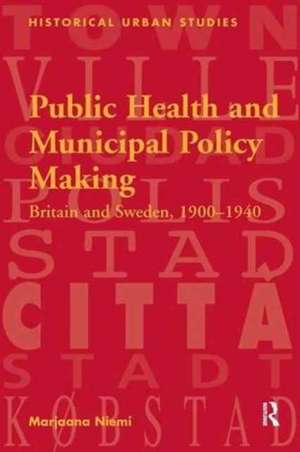Public Health and Municipal Policy Making: Britain and Sweden, 1900–1940
Autor Marjaana Niemien Limba Engleză Paperback – 25 noi 2016
| Toate formatele și edițiile | Preț | Express |
|---|---|---|
| Paperback (1) | 469.34 lei 6-8 săpt. | |
| Taylor & Francis – 25 noi 2016 | 469.34 lei 6-8 săpt. | |
| Hardback (1) | 1054.71 lei 6-8 săpt. | |
| Taylor & Francis – 28 apr 2007 | 1054.71 lei 6-8 săpt. |
Preț: 469.34 lei
Nou
Puncte Express: 704
Preț estimativ în valută:
89.82€ • 93.43$ • 74.15£
89.82€ • 93.43$ • 74.15£
Carte tipărită la comandă
Livrare economică 14-28 aprilie
Preluare comenzi: 021 569.72.76
Specificații
ISBN-13: 9781138270985
ISBN-10: 1138270989
Pagini: 242
Dimensiuni: 156 x 234 mm
Greutate: 0.45 kg
Ediția:1
Editura: Taylor & Francis
Colecția Routledge
Locul publicării:Oxford, United Kingdom
ISBN-10: 1138270989
Pagini: 242
Dimensiuni: 156 x 234 mm
Greutate: 0.45 kg
Ediția:1
Editura: Taylor & Francis
Colecția Routledge
Locul publicării:Oxford, United Kingdom
Notă biografică
Marjaana Niemi is Senior Research Fellow in the Department of History at the University of Tampere, Finland.
Recenzii
’In sum the book makes an important contribution both to science studies and to the history of municipal health care.’ Urban History ’...a stimulating and important work which deserves an audience not simply confined to urban and medical historians.’ Economic History Review ’This book offers valuable insights on how the formation of public health campaigns in early twentieth century was highly dependent on local social, political and economic contexts, and shows that the language of medical science could be used differently, depending on who was using it, for what purposes and where.’ Scandinavian Economic History Review
Cuprins
Chapter 1 Knowledge and the City; Chapter 2 Industrial Cities; Chapter 3 Policy Legacies; Chapter 4 Regulating Family Life; Chapter 5 Shaping Urban Society; Chapter 6 Contesting and Negotiating Public Health Policies; Chapter 7 Conclusion;
Descriere
Public health policies had a profound impact on urban life in the late nineteenth and early twentieth centuries, yet relatively few people took an active interest in the formulation of these policies. In this book Marjaana Niemi examines the impact of different political aims and pressures on 'scientific' health policies through the analysis of public health programmes in two case studies, one in Birmingham and the other in Gothenburg. By examining early twentieth-century campaigns concerned with infant welfare and the prevention of tuberculosis, the book provides illuminating insights into the relationship between public health and the regulation of urban life.














